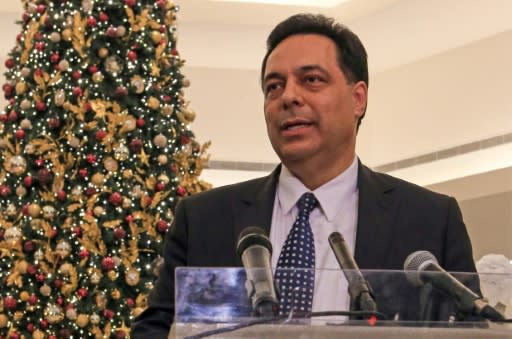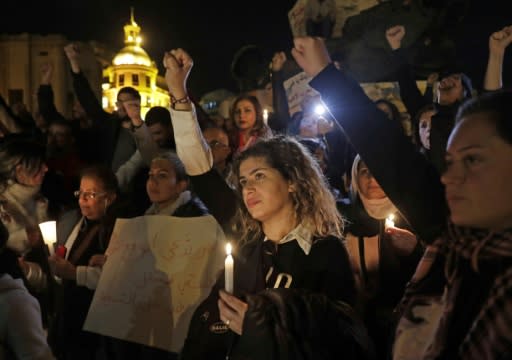Hezbollah-backed Diab designated new Lebanon PM
Crisis-hit Lebanon's president Thursday designated Hezbollah-backed academic and former minister Hassan Diab as the country's new prime minister, ending nearly two months of political wrangling. The little-known 60-year-old engineering professor at the American University of Beirut (AUB) will replace outgoing premier Saad Hariri amid nationwide anti-government protests and the worst economic crisis since Lebanon's 1975-1990 civil war. The self-styled independent was thrust forward as a candidate with the backing of parliamentary blocs affiliated with Shiite movements Hezbollah and Amal as well the Free Patriotic Movement (FPM), founded by Christian President Michel Aoun. But the career academic who held the education portfolio in a government formed after Hezbollah brought down a previous Hariri cabinet did not receive the backing of Sunni blocs or their own Christian allies. His nomination, as a result, will yield a lopsided government that observers warn could fuel sectarian tensions and complicate efforts to secure international aid needed to pull Lebanon back from the brink of default. In his first remarks since his designation, Diab pledged to form a government "as soon as possible," saying he will start consultations with political parties and representatives of the popular movement on Saturday. He addressed protesters by saying their "uprising represents me". There voices, he said, "should remain a warning bell that the Lebanese will no longer allow a return to conditions before 17 October", the date the protests started. - 'Doesn't represent us' - Hariri resigned seven weeks ago under pressure from an unprecedented wave of protests demanding a complete overhaul of the political system, leaving the country without a government to tackle its worst ever economic crisis. The 49-year-old Sunni leader had in recent days been seen as likely to head a technocrat-dominated government -- a key demand of protesters. But he announced late Wednesday he was pulling out, saying his rivals opposed a cabinet of technocrats. His bloc on Thursday did not name its own candidate for premier, stripping Diab of critical Sunni political cover. A power-sharing system enshrined after the end of the civil war means that the prime minister's position should be filled by a member of the Sunni Muslim community. As the leading Sunni representative, the premier is usually backed by the community's main leaders. But Lebanon's heavyweight Sunni politicians stopped short of backing Diab, raising fears that the next government will be polarised and unable to tackle urgent reforms demanded by protesters and the international community. After Aoun's announcement on Thursday, dozens of men gathered outside Diab's house, chanting slogans in support of Hariri. Most hailed from the mainly Sunni Tareeq al-Jadeedeh district, a stronghold of Hariri and his Future Movement. "We are here to say that we reject Hassan Diab, because he was only endorsed by six Sunni lawmakers," one man told AFP, referring to parliamentarians outside the main Sunni bloc. Hariri responded by calling on his supporters to refrain from taking to the streets. In protest squares across the country, crowds swelled after Diab's designation. - 'Sunni-Shiite schism' - Imad Salamey, a political science professor at the Lebanese American University, said Diab's appointment will only "deepen" Lebanon's crisis. It will mean "the coming government will be dominated by Hezbollah (and its allies) without political cover from Hariri and the Sunnis," he told AFP. "This will drive Lebanon towards a Sunni-Shiite schism and drown the revolution in sectarian discourse." Diab, who is not politically affiliated and little known to the public, describes himself on his website as "one of the rare technocrat ministers since Lebanon's independence". Three days after the start of the anti-government protests, he called them a "historic and awe-inspiring scene". "The Lebanese people have united to defend their rights to a free and dignified life," he wrote on Twitter. While the huge crowds that filled the squares of Beirut and other Lebanese cities two months ago have dwindled, the protest movement has remained vibrant. Tensions have been heightened by the looming bankruptcy of the debt-burdened Lebanese state. A government dominated by Hezbollah, which has been targeted by increasingly biting US sanctions, is not likely to secure billions of dollars in frozen aid. The Lebanese pound, officially pegged to the US dollar, has lost around 30 percent of its value on the black market, while companies have been paying half-salaries over the past two months, as well as laying off employees. Lebanese Prime Minister-designate Hassan Diab pledged to form a government 'as soon as possible', in a speech after his nomination at the presidential palace While the huge crowds that filled the squares of Lebanese cities two months ago have dwindled, the protest movement is still alive and keeping politicians in check Former Lebanese prime minister Saad Hariri resigned 7 weeks ago and was tipped to lead a new technocrat-dominated government, but pulled out Wednesday




